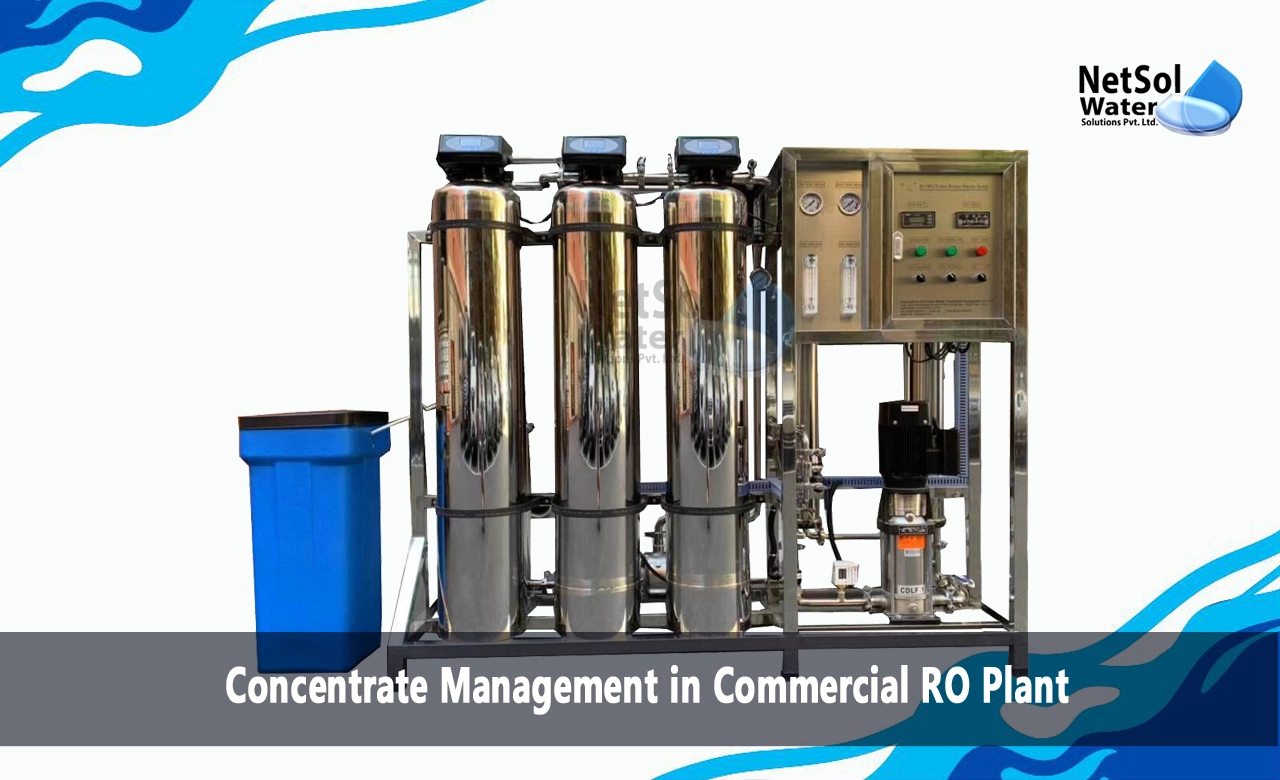Concentrate Management in Commercial RO Plant
Reverse Osmosis (RO) serves as a leading water treatment method in both commercial and industrial units, effectively purifying water and removing contaminants. Despite its ability to produce highly purified water, RO systems also yield a concentrated waste stream termed concentrate or brine. Effective management of this concentrate is essential for sustaining the RO system's efficiency, lessening environmental repercussions, and adhering to regulatory standards. We look into the significance of concentrate management and the diverse strategies implemented in commercial RO plants.
Understanding Concentrate in RO Systems
During the reverse osmosis (RO) process, the feed water is pushed through semi-permeable membranes. These membranes selectively allow water molecules to pass while trapping dissolved solids, suspended particles, and other impurities. These trapped impurities gather in the waste stream, referred to as concentrate or brine. The concentration of impurities in this stream can be significantly higher than in the feed water. If not managed correctly, this can pose environmental risks.
Challenges Associated with Concentrate Management
Concentrate management have several challenges in commercial RO plants, including:
1. Environmental Impact: Improper disposal of concentrate can lead to pollution of water bodies, soil, and groundwater resources due to the high concentration of contaminants.
2. Regulatory Compliance: Many regions have strict regulations regarding the discharge of concentrate, particularly in terms of salinity levels and the presence of specific contaminants.
3. Membrane Scaling and Fouling: If concentrate is not effectively managed, it can lead to scaling and fouling of the RO membranes, reducing their efficiency and lifespan.
4. Energy and Water Consumption: Some concentrate management strategies may require additional energy and water consumption, increasing operational costs.
Concentrate Management Strategies
Various strategies can be used for effective concentrate management in commercial RO plants, depending on the specific requirements and constraints of the application. Here are some common approaches that can be employed:
1. Surface Water Discharge: In some cases, concentrate can be discharged into surface water bodies, such as rivers or oceans, provided it meets the relevant regulatory standards and does not adversely impact the receiving water body.
2. Evaporation Ponds: Concentrate can be stored in lined evaporation ponds, where water evaporates, leaving behind solid residues that can be further treated or disposed of.
3. Deep Well Injection: In areas with suitable geological formations, concentrate can be injected into deep wells, effectively isolating it from surface and groundwater resources.
4. Zero Liquid Discharge (ZLD): ZLD systems employ advanced treatment technologies, such as evaporators, crystallizers, and membrane filtration, to recover water and produce solid residues that can be disposed of or reused.
5. Concentrate Minimization: Strategies like feed water pretreatment, membrane system optimization, and concentrate recycling can be employed to minimize the volume of concentrate generated.
Factors Influencing Concentrate Management Decisions
The choice of concentrate management strategy for a commercial RO plant depends on various factors, including:
1. Feed Water Quality: The composition and concentration of contaminants in the feed water will influence the characteristics of the concentrate and the appropriate management approach.
2. Regulatory Requirements: Local and regional regulations regarding concentrate discharge or disposal must be carefully considered and adhered to.
3. Environmental Considerations: The potential impact of the concentrate on the surrounding environment, including water bodies, soil, and air, should be evaluated and minimized.
4. Cost and Energy Efficiency: The capital and operational costs, as well as the energy requirements of different concentrate management strategies, must be considered for economic feasibility.
5. Site-Specific Conditions: Factors such as the availability of suitable land, geological formations, and proximity to water bodies will influence the viability of certain concentrate management options.
Best Practices for Concentrate Management
Effective concentrate management in commercial RO plants requires a combination of strategic planning, operational practices, and ongoing monitoring. Here are some best practices to consider:
1. Conduct a Thorough Assessment: Evaluate the feed water quality, regulatory requirements, site-specific conditions, and potential environmental impacts to determine the most suitable concentrate management strategy.
2. Implement Pretreatment: Employ appropriate pretreatment techniques, such as multimedia filtration or softening, to reduce the concentration of contaminants in the feed water and minimize concentrate generation.
3. Optimize RO System Operation: Regularly monitor and adjust RO system parameters, such as recovery rates and membrane cleaning cycles, to optimize performance and minimize concentrate volume.
4. Explore Concentrate Reuse and Recycling: Investigate opportunities for reusing or recycling concentrate within the plant or for other applications, reducing the overall volume of waste.
5. Establish Monitoring and Reporting: Implement regular monitoring and reporting protocols to ensure compliance with regulations and to identify potential issues or areas for improvement in concentrate management.
6. Invest in Advanced Treatment Technologies: Consider investing in advanced treatment technologies, such as ZLD systems or membrane distillation, to achieve higher water recovery rates and minimize concentrate volumes.
Conclusion
Efficiently managing concentrate is crucial for the operations of reverse osmosis (RO) plants. By implementing effective strategies and best practices, these plants can minimize environmental impact, adhere to regulations, and optimize system efficiency and longevity. Regular monitoring, system optimization, and the adoption of advanced treatment technologies are essential steps in achieving these goals. Additionally, prioritizing compliance with regulations ensures environmental and public health protection. Continued research, knowledge-sharing, and innovation within the industry further support sustainability and resilience in water treatment. Together, these efforts contribute to a more responsible and sustainable water treatment process, safeguarding precious water resources for future generations.
Do you need an advice or assistance on selecting the best water and waste water treatment unit? We have solutions for all your problems!
Let us now your problem, our experts will make sure that it goes away.
For an assistance or related query,
Call on +91-965-060-8473 Or write us at enquiry@netsolwater.com



